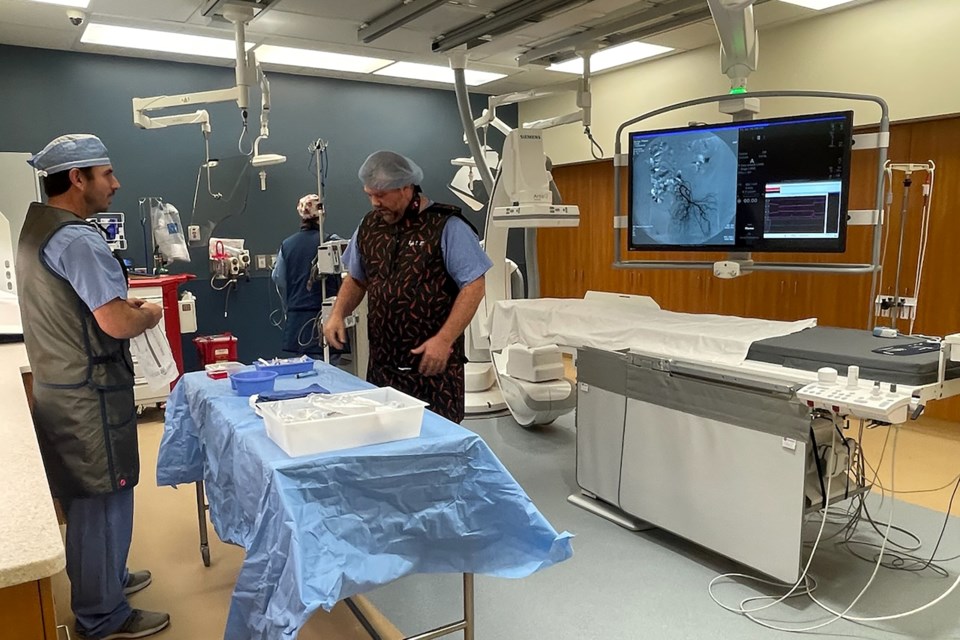NEWS RELEASE
MY MICHIGAN HEALTH
*************************
Earlier this year, MyMichigan Medical Center Alpena received Certificate of Need (CON) approval from the Michigan Department of Health and Human Services to begin emergency percutaneous coronary intervention (PCI) for the care of patients with ST-elevation myocardial infarction (STEMI), the most serious type of heart attacks. In STEMI patients, the coronary artery is completely blocked off by a blood clot. As a result of this blockage, all of the heart muscle being supplied by the affected artery starts to die.
In preparation for emergent PCI intervention, MyMichigan Medical Center EMS and the Medical Center have been developing a Regional STEMI Alert Program designed to rapidly identify patients who are suffering from STEMIs. This lifesaving program is based on an established state protocol which approves up to a 90-minute transport time to bypass the closest Emergency Department and take STEMI patients to MyMichigan Medical Center Alpena, the nearest Percutaneous Coronary Intervention (PCI) Center. Upon arrival to the ER, the patient is taken to the cardiac catheterization lab so that blood flow can be quickly reestablished to their heart.
This streamlined approach is also implemented in cases where a patient arrives in the ER and presents with heart attack symptoms. The patient is quickly moved into an exam room where a 12-lead ECG is performed to determine the extent of the cardiac emergency and the course of action.
“To ensure overall success of the program, we are actively collaborating with other local EMS agencies to provide training and share best practices,” said Nicholas Harrison, AAS, EMT-P I/C, operations supervisor for MyMichigan Medical Center EMS Alpena and Northeast Michigan MCA coordinator. “Our current local EMS agency partners include Alcona County EMS, Alpena City Fire, Hillman EMS, Rogers City Ambulance Authority, Tri Township EMS, and Albert Township Fire Department in Lewiston. We also anticipate additional local agencies partnering with us in the future.”
By completing specialized training on how to recognize a STEMI on a 12-lead electrocardiogram, paramedics from our regional EMS agencies can perform the test upon arrival at the scene, quickly identify cardiac emergencies and immediately notify the ER. From there, the ER staff activates the cardiac cath team and admits the patient. This allows for expedited treatment once the patient arrives.
“We are so glad to be able to offer this streamlined treatment approach for patients experiencing cardiac emergencies, said Invasive Cardiologist Daniel Harber, D.O. “Time is muscle and when it comes to the heart every second counts. Upon arrival to the cardiac catheterization lab, a diagnostic catheterization is performed to locate the site of the blockage. Once located, an intervention is performed to open the artery and re-establish blood flow. Our team has set a target of <=90 minutes for door-to-balloon intervention based on recommendations by the American College of Cardiology. By following these recommendations, the patient’s chance of recovery without loss of heart muscle or long-term complications is very high.”
In addition to establishing a Regional STEMI Alert Program, MyMichigan Medical Center Alpena has been actively recruiting interventional cardiologists to join the MyMichigan Cardiology team and has undergone a renovation of its previous operating room area to establish a new state-of-the art cardiac catheterization lab, as well as a non-invasive/invasive cardiology suite.
“We urge community members not to ignore the warning signs of a heart attack,” said Harrison. “The best way to prevent irreversible heart damage is to dial 911 immediately. Upon arrival emergency medical services staff can begin treatment when they arrive — up to an hour sooner than if someone goes to the hospital by car. EMS staff are also trained to provide resuscitation efforts to someone whose heart has stopped. Even if your symptoms end up pointing to a different medical problem, you’ll be in the right place for treatment. When it comes to a heart attack, time is muscle, and the first hour is critical for effective treatment.”
MyMichigan Medical Center EMS in Midland and Gladwin has been following the state STEMI protocol for nearly ten years and has received the American Heart Association’s Mission: Lifeline® EMS Gold Award for nine consecutive years.
Those who would like additional information about MyMichigan’s Regional STEMI Alert Program may click here.
**********************



